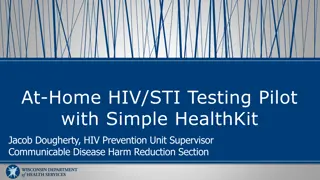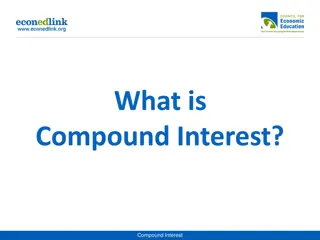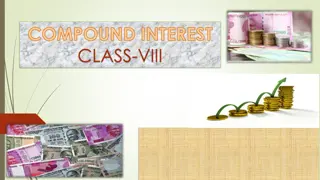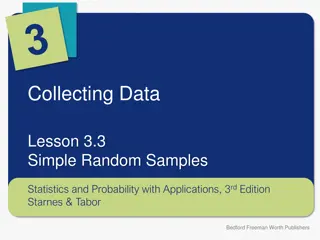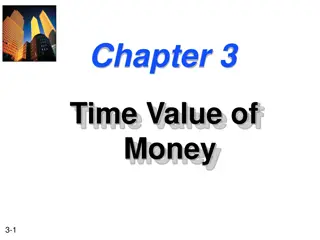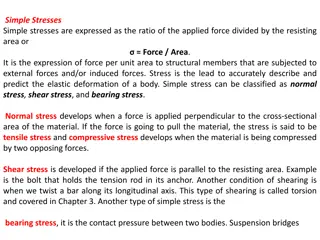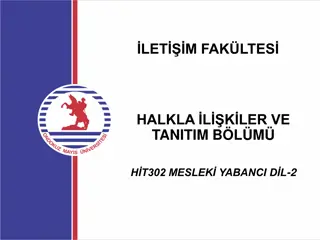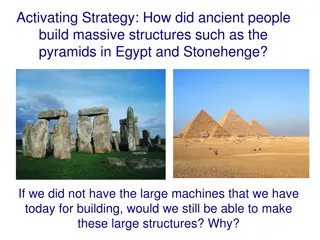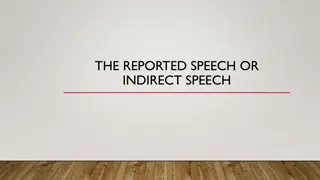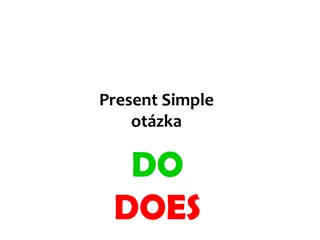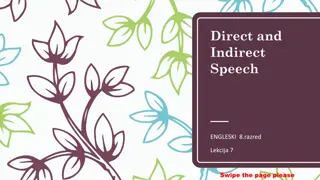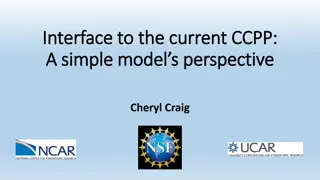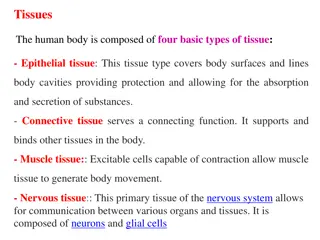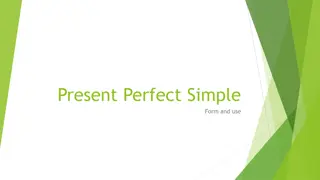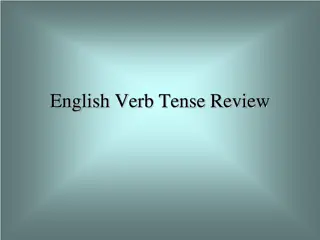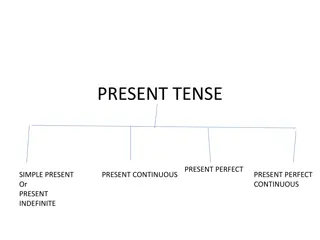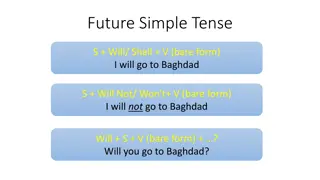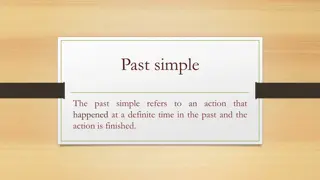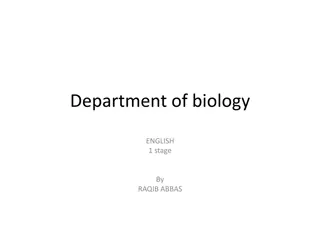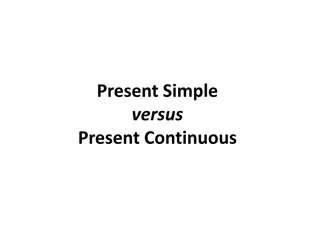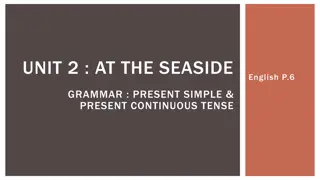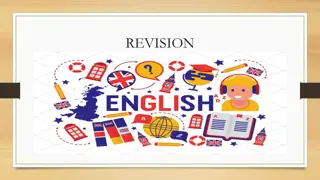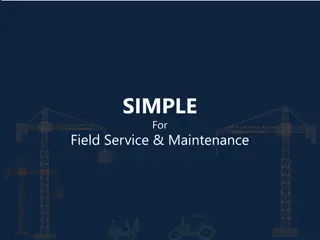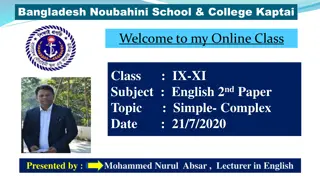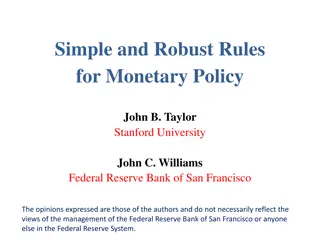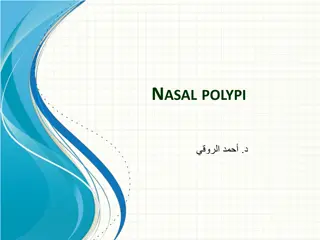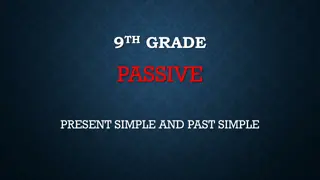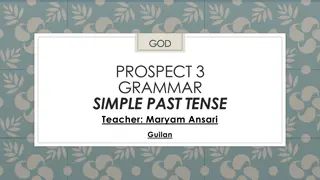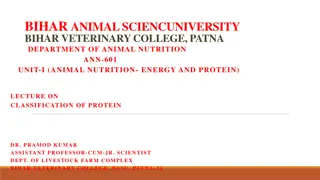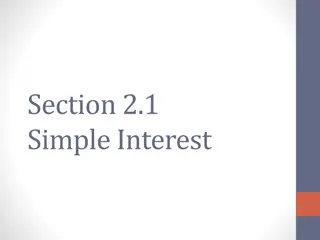At-Home HIV/STI Testing Pilot with Simple HealthKit
Communicable Disease Harm Reduction Section collaborated with Simple HealthKit to offer free HIV, syphilis, gonorrhea, chlamydia, and trichomoniasis testing to Wisconsin residents over 18 from August 25, 2023, to October 20, 2023. The aim was to make HIV and STI testing more accessible to those with
0 views • 23 slides
Learning Future Simple Tense in English Lesson
Learn how to use the future simple tense correctly in English through a lesson focused on planning a trip to France. The lesson includes reading exercises, grammar rules, error correction practice, dialogues, and more to help you understand and apply the future simple tense effectively.
2 views • 7 slides
Understanding Compound Interest and Simple Interest Formulas
Interest rates play a crucial role in financial transactions. Compound interest is earned on both the principal and accumulated interest, while simple interest is earned solely on the principal amount. Different compounding frequencies affect the overall interest earned. Learn how to calculate simpl
1 views • 14 slides
How to Take Care of Your Home Simple and Effective Solutions
Want to keep your home in good condition without getting involved in costly remodelling. Explore these simple and effective solutions for taking care of your home.\n\/\/bresdel.com\/blogs\/611501\/How-to-Take-Care-of-Your-Home-Simple-and-Effective\n
1 views • 22 slides
Understanding Compound Interest in Class VIII Mathematics
In this chapter, students will learn about simple interest and compound interest, memorize their formulas, derive compound interest formula from simple interest concept, calculate compound interest with different compounding frequencies, understand growth and depreciation concepts, and derive formul
1 views • 29 slides
Understanding Simple Random Samples in Statistics
In this lesson, you will learn how to obtain a simple random sample using slips of paper or technology, understand sampling variability and the impact of sample size, and use simulations to test claims about population proportions. The concept of Simple Random Sample (SRS) is explained, where every
0 views • 18 slides
Understanding the Time Value of Money: Simple vs Compound Interest
Explore the importance of time in financial decisions, the difference between simple and compound interest, and how it affects the future value of your investments. Learn about the formulas for simple interest, examples of its application, and the significance of compound interest for maximizing ret
1 views • 60 slides
Learning the Future Simple Tense with Regular Verbs in French
Explore how to form, recognize, and use the future simple tense in French for talking about your plans using regular verbs. Understand the differences between le futur proche and le futur simple and learn the endings for conjugating verbs in the future tense.
0 views • 8 slides
Understanding Simple Stresses in Structural Engineering
Simple stresses play a crucial role in structural analysis by determining the force per unit area on structural members. Normal, shear, and bearing stresses are key classifications that describe the behavior of materials under external forces. This article delves into the concepts of simple stresses
2 views • 18 slides
Examples of Passive Voice and Simple Present Tense in English
Explore various examples of passive voice and simple present tense usage in English sentences, including questions and statements with explanations. Understand how to form passive voice and identify simple present tense sentences through practical examples.
0 views • 15 slides
Understanding the Role of Simple Machines in Ancient and Modern Construction
Explore how ancient people built massive structures like the pyramids and Stonehenge without modern machines, diving into the principles of work, force, and simple machines. Discover how simple machines make work easier for us and how they have been essential in both ancient and modern construction
0 views • 39 slides
Mastering Reported Speech: Simple Present to Simple Past
Learn how to convert statements from the simple present tense to the simple past tense in reported speech with clear examples. Practice exercises are provided for better understanding, covering various sentence structures including negative sentences and present continuous to past continuous transfo
0 views • 45 slides
Mastering Simple and Compound Sentences: Rules and Examples
Explore the world of simple and compound sentences through detailed explanations, examples, and rules. Learn how to identify, structure, and transform sentences from compound to simple form. Enhance your understanding of sentence construction and improve your writing skills.
0 views • 17 slides
Present Simple Questions and Statements Practice
Practice forming present simple questions and statements using the verb "do" and "does" with different subjects such as "I," "you," "she," "he," "we," and "they." This interactive exercise includes examples and images to help reinforce understanding of the present simple tense in English.
0 views • 8 slides
Learn Direct and Indirect Speech in English: Grade 8 Lesson 7
Explore the transformation from direct to indirect speech in various tenses such as Simple Present, Present Continuous, Simple Past, Past Continuous, and Simple Future. Understand the changes in verbs and adverbs of time and place. Practice exercises to enhance your understanding.
0 views • 28 slides
Understanding the Interface to the Current CCPP: A Simple Model's Perspective
This content explores the interface to the current CCPP from a simple model's viewpoint, focusing on two simplistic schemes - kinetics and chem_solve. It delves into how the MusicBox simple driver model adapts chemical species using temperature and rate constants. Users can control the run sequence
0 views • 9 slides
Understanding Simple Past Tense in English: Rules and Examples
The simple past tense is a fundamental form in Modern English used to describe past events. It involves regular verbs adding "-ed" and irregular verbs having different forms. The construction of the simple past helps distinguish it from other past tense forms like past perfect and past progressive.
0 views • 33 slides
Understanding Epithelial Tissues: Structure and Function
Epithelial tissues play crucial roles in the human body, covering surfaces, lining cavities, and forming glands. They are highly cellular and rest on a basement membrane, separating them from connective tissues. Epithelial tissues serve functions such as protection, absorption, secretion, and contra
0 views • 15 slides
Understanding the Present Perfect Simple Tense and Its Usage
Learn about the basic rules, formation, and usage of the Present Perfect Simple tense in English. Explore how to form the tense, use shortened forms, understand when to use "have" and "has" with past participles, differentiate between Present Perfect and Past Simple, know when to use the Present Per
0 views • 11 slides
Mapping Project Overview and Attributes
This content provides detailed information about a mapping project involving the transition from S.S-53 to S-124, including complex and simple attributes, spatial references, and metadata. It covers aspects such as domain models, NAVWARN preamble, complex vs. simple attributes, and more. The content
0 views • 23 slides
English Verb Tense Review: Simple Present and Simple Past
Simple Present Tense is used for habitual actions, unchanging truths, and general statements of fact. It is indicated by words like always, usually, and sometimes. Simple Past Tense is used for completed actions and past habits indicated by words such as yesterday and last night. The forms and indic
0 views • 46 slides
Understanding Simple Present Tense and Its Usages
Simple Present Tense is used for habits, routines, and permanent truths. This tense follows a specific structure for positive, negative, and interrogative sentences. Through examples and exercises, learn how to correctly use Simple Present Tense in everyday conversations.
0 views • 8 slides
Understanding Future Simple Tense in English Grammar
The Future Simple Tense in English is used to express decisions made at the moment of speaking, announce planned future events, show willingness or unwillingness for future actions, express thoughts, and talk about events certain to happen. It is often accompanied by adverbs to indicate timing. Ques
0 views • 11 slides
Understanding the Past Simple Tense in English Grammar
The past simple tense refers to actions that occurred at a specific time in the past and are now completed. This tense follows a specific rule where the subject is combined with a verb (regular or irregular) and a complement. Adverbs like "yesterday," "ago," and "last" are commonly used with past si
0 views • 9 slides
Understanding Past Simple Tense in English Grammar
The past simple tense is used to describe completed actions or events that happened at a specific time in the past. Regular verbs form the past simple by adding "-ed", while irregular verbs have unique past tense forms. The structure for negative and question forms involves the auxiliary verb "did".
0 views • 6 slides
Understanding the Difference Between Present Simple and Present Continuous Tenses
Present Simple and Present Continuous tenses serve different purposes in English grammar. The Present Continuous is used for actions happening at the moment, longer actions in progress, and future plans. On the other hand, the Present Simple is used for repeated actions and facts/generalizations. Re
0 views • 18 slides
Learning Present Simple and Present Continuous Tenses at the Seaside
Explore the usage of present simple and present continuous tenses through examples and exercises related to everyday activities at the seaside. Understand how to form sentences in these tenses and differentiate between them based on ongoing actions or habitual activities. Practice completing sentenc
0 views • 51 slides
Mastering Present Perfect Simple: Rules, Examples, and Practice
Explore the Present Perfect Simple tense with rules, examples, and practice exercises. Learn how to form positive, negative, and question sentences using time expressions. Dive into short forms, negatives, questions, and more to enhance your understanding. Complete letters using Past Simple of Prese
0 views • 8 slides
Streamlining Field Service & Maintenance with SIMPLE Platform
Easily manage field service and maintenance tasks with the SIMPLE platform integrated with workflow and management applications. Learn how SIMPLE simplifies preventive maintenance, visual inspection reports, component inspections, and more. Overcome challenges in field service processes and track pe
0 views • 19 slides
Transforming Complex Sentences to Simple Sentences - Lesson Overview
In this lesson, students will learn how to transform complex sentences to simple sentences in English grammar. The lesson covers the structure of complex sentences using conjunctions like "Though" and "Although" and guides students on converting them into simple sentences with expressions like "In s
0 views • 12 slides
Online Class on Simple-Complex Topic at Bangladesh Noubahini School & College, Kaptai
Welcome to an Online Class at Bangladesh Noubahini School & College, Kaptai, where Mohammed Nurul Absar, Lecturer in English, is presenting a lesson on Simple-Complex topics for students of classes IX-XI. The lesson aims to enhance students' abilities to solve simple-complex problems and understand
0 views • 10 slides
Simple and Robust Rules for Monetary Policy Overview
This document discusses the historical background, empirical experience, characteristics of simple rules, robustness, and the comparison between optimal control and simple rules in monetary policy. It explores the evolution of policy rules from Smith and Ricardo to modern approaches, emphasizing the
0 views • 22 slides
Understanding Nasal Polypi and Their Classifications
Nasal polyps are simple oedematous growths in the nasal mucosa that can be unilateral or bilateral. They are classified into simple nasal polyps, fungal polyps, and malignant polyps. Simple nasal polypi, also known as inflammatory polyps, include ethmoidal polyps and antrochoanal polyps. Fungal poly
0 views • 18 slides
Learn Passive Voice in Present Simple and Past Simple Tenses for 9th Grade
Explore examples and practice sentences to understand how to form passive voice in present simple and past simple tenses. Learn how to transform active voice sentences into passive voice and enhance your English grammar skills effectively.
0 views • 10 slides
Understanding Simple Past Tense in Grammar
In this file, we delve into the concept of simple past tense in grammar. Through examples and explanations, you will learn how to use the simple past tense to talk about completed actions in the past. The structure, usage, and importance of simple past tense are covered extensively to enhance your u
0 views • 30 slides
Classification of Proteins in Animal Nutrition: Simple Proteins vs. Conjugated Proteins
Proteins in animal nutrition are classified into two main groups: simple proteins and conjugated proteins. Simple proteins can be further divided into fibrous and globular proteins based on their shape, solubility, and chemical composition. Fibrous proteins, such as collagens, elastin, and keratins,
0 views • 18 slides
Weak Visibility Queries of Line Segments in Simple Polygons - Overview
This information discusses weak visibility queries of line segments in simple polygons, focusing on topics such as visibility of line segments, visibility polygons, visibility graphs, and related previous work on preprocessing and data structures for visibility queries in simple polygons.
0 views • 26 slides
Understanding Simple Interest in Banking and Finance
Explore the concept of simple interest and its application in banking and finance. Learn how to calculate simple interest using the formula and solve examples to understand its practical implications. From earning interest on savings to owing interest on loans, grasp the fundamental principles of in
0 views • 23 slides
Understanding Interest and Calculating Simple Interest
In the realm of financial education, interest plays a crucial role both in savings and debt. Interest on savings helps you earn money, while interest on debt results in paying back more than borrowed. This article explains the concept of interest, how to calculate simple interest, and the difference
0 views • 8 slides
Sentence Transformation Lessons - Simple to Complex
Learn how to transform sentences from simple to complex with practical examples and explanations. Enhance your English language skills by understanding the various structures and forms used in sentence transformation. Explore different scenarios and master the art of creating complex sentences from
0 views • 15 slides
